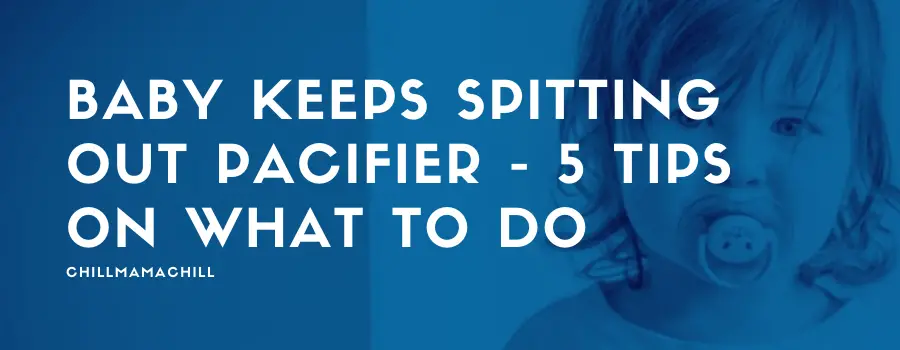Baby Keeps Spitting Out Pacifier And Crying

Why Is My Baby Spitting It Out The Pacifier Kiindred Likewise, if your newborn cries when their pacifier falls out several times a night and they cannot reinsert it themselves and cannot self soothe, they might be developing a need for a sleep prop. in such cases, removing the pacifier at once, with or without warning, maybe the best choice. be prepared for tantrums and crying. Love ’em or hate ’em, for many of us, pacifiers are a necessity. it’s estimated that anywhere from 75% – 85% of babies and toddlers have used a pacifier for soothing at some point. and it’s understandable! pacifiers can be a great way to provide instant soothing and to calm fussy, inconsolable babies or toddlers. (that’s the love.

Baby Keeps Spitting Out Pacifier Pregnant Health Tips These small, nipple like objects are designed to soothe and calm fussy babies and are often used as a tool to help them fall asleep. however, as with anything related to baby care, there are always concerns about the best ways to use a pacifier. one common concern among parents is how to keep their baby from spitting out the pacifier. Avoid forcing your baby to take a pacifier. although they can reduce the risk of sids, they are not necessary for all babies. if your baby continually spits out his pacifier, he probably doesn't need one. follow your baby's cues. sometimes he'll take the pacifier happily, and other days he will refuse it. never hold it in his mouth or force him. Mood and preference. babies are less likely to accept a pacifier if they are upset, fussy, or crying. waiting until your baby is calm and relaxed to offer a pacifier will decrease the chances that they will push it back out with their tongue. a hungry baby will not appreciate a pacifier that does not give them anything to eat no matter how hard. 1. observe their behavior: if your baby continues to fuss or cry even after you have tried soothing them through other means, consider offering them their pacifier. 2. consider the timing: if your child has recently eaten, a full tummy may cause them to spit out the pacifier as they do not feel the need to suck for hunger. 3.

Baby Ava Spitting Out Pacifier Youtube Mood and preference. babies are less likely to accept a pacifier if they are upset, fussy, or crying. waiting until your baby is calm and relaxed to offer a pacifier will decrease the chances that they will push it back out with their tongue. a hungry baby will not appreciate a pacifier that does not give them anything to eat no matter how hard. 1. observe their behavior: if your baby continues to fuss or cry even after you have tried soothing them through other means, consider offering them their pacifier. 2. consider the timing: if your child has recently eaten, a full tummy may cause them to spit out the pacifier as they do not feel the need to suck for hunger. 3. Coat it in breast milk or formula. if your baby seems to not know what they’re supposed to do with a pacifier, dipping it in a little bit of breast milk or formula can entice them to actually. The idea is that before 12 months, your child hasn’t had the time (or the cognitive ability) to form a deep attachment to a pacifier, so taking it away may not be as difficult. not the case if you try to wean a toddler off his pacifier, however. starting around 18 months, a toddler has likely formed strong feelings of attachment to his pacifier.

Baby Keeps Spitting Out Pacifier 5 Tips On What To Do Chill Mama Chill Coat it in breast milk or formula. if your baby seems to not know what they’re supposed to do with a pacifier, dipping it in a little bit of breast milk or formula can entice them to actually. The idea is that before 12 months, your child hasn’t had the time (or the cognitive ability) to form a deep attachment to a pacifier, so taking it away may not be as difficult. not the case if you try to wean a toddler off his pacifier, however. starting around 18 months, a toddler has likely formed strong feelings of attachment to his pacifier.

Comments are closed.